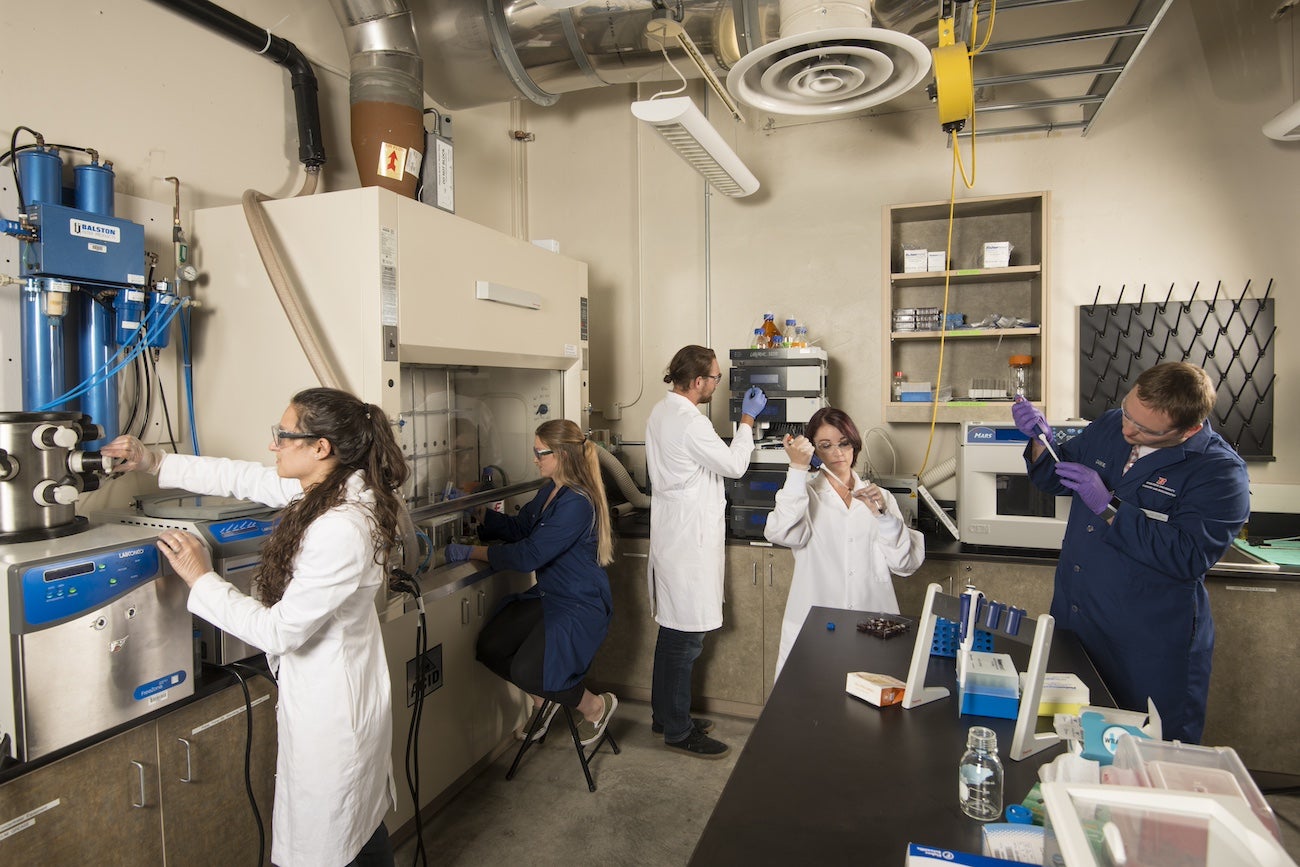
Visitors to the Science Building will discover three important areas of research and education, including:
- How Boise State students and faculty are positively impacting food and dairy processing technology and workforce development.
- How an important genetic risk factor for Alzheimer’s disease operates at the molecular level to enhance dementia risk.
- How a team is creating a new method for early detection of Alzheimer’s disease using scent and virtual reality.
Science Building Presenters
-

Owen McDougal
Professor of chemistry
McDougal is a natural products chemist who studies food and dairy process chemistry. He works closely with potato and dairy processors to provide real world research projects for students on topics of value to industry. McDougal integrates the biomolecular sciences (chemistry, biology and physics) into every aspect of his work to train students as interdisciplinary scientists who can work effectively as part of a team.
McDougal is also the director of Boise State’s Food and Dairy Innovation Center.
“Industry is coming to us at Boise State, and they want us as a partner. They want a pipeline for students to jobs, and we are drawing on our strengths in chemistry, biology, engineering and computer science, not in a traditional food science perspective, but in a science and technology emphasis, based on our strengths as an institution of transdisciplinary research.”
McDougal is a natural products chemist who studies food and dairy process chemistry. He works closely with potato and dairy processors to provide real world research projects for students on topics of value to industry. McDougal integrates the biomolecular sciences (chemistry, biology and physics) into every aspect of his work to train students as interdisciplinary scientists who can work effectively as part of a team.
McDougal is also the director of Boise State’s Food and Dairy Innovation Center.
“Industry is coming to us at Boise State, and they want us as a partner. They want a pipeline for students to jobs, and we are drawing on our strengths in chemistry, biology, engineering and computer science, not in a traditional food science perspective, but in a science and technology emphasis, based on our strengths as an institution of transdisciplinary research.”
-

Sydney Boutros
Assistant professor of psychology
Boutros is a Behavioral Neuroscientist. Her primary field of research is learning and memory—specifically, exploring its underlying mechanisms to investigate cognitive impairment and neurodegeneration (such as Alzheimer’s and Parkinson’s disease). She has been at the forefront of a novel hypothesis: that neural activity leads to memory formation via DNA breaks, thereby inducing gene expression.
Boutros says: “Your sense of smell is unique compared to your other senses – smells travel directly to the emotion and memory centers of your brain, collectively called the Limbic System. We hypothesize this is why smells can conjure such vivid memories. Yet, we don’t pay much attention to smell. Our sense of smell naturally declines as we age, but faster loss of smell has been shown to precede diagnosis of Alzheimer’s disease by 5-7 years.”
“By the time a person is diagnosed with Alzheimer’s disease, the pathology in the brain has already progressed significantly. Early detection and early intervention is key to slow the progress of this devastating disease. We aim to combine virtual reality (VR) and scent to detect Alzheimer’s disease earlier, providing a better quality of life to those affected,” said Boutros.
Boutros is a Behavioral Neuroscientist. Her primary field of research is learning and memory—specifically, exploring its underlying mechanisms to investigate cognitive impairment and neurodegeneration (such as Alzheimer’s and Parkinson’s disease). She has been at the forefront of a novel hypothesis: that neural activity leads to memory formation via DNA breaks, thereby inducing gene expression.
Boutros says: “Your sense of smell is unique compared to your other senses – smells travel directly to the emotion and memory centers of your brain, collectively called the Limbic System. We hypothesize this is why smells can conjure such vivid memories. Yet, we don’t pay much attention to smell. Our sense of smell naturally declines as we age, but faster loss of smell has been shown to precede diagnosis of Alzheimer’s disease by 5-7 years.”
“By the time a person is diagnosed with Alzheimer’s disease, the pathology in the brain has already progressed significantly. Early detection and early intervention is key to slow the progress of this devastating disease. We aim to combine virtual reality (VR) and scent to detect Alzheimer’s disease earlier, providing a better quality of life to those affected,” said Boutros.
-

Troy Rohn
Professor of biology
The Rohn lab has a long-standing interest in understanding the molecular underpinnings of Alzheimer’s disease (AD). During the progression of Alzheimer’s disease, many brain cells die particularly in the hippocampus. Because the hippocampus is an area of the brain involved in memory, Alzheimer’s is primarily a disease where afflicted individuals lose their capacity for memory and eventually other important cognitive skills involved in executive functions.
The primary focus of Rohn’s lab currently is understanding how inheritance of the apolipoprotein E4 (APOE4) gene greatly enhances dementia risk. Although it is well established that inheritance of the APOE4 allele increases the risk of Alzheimer’s approximately tenfold, the mechanism of how this protein contributes to the disease pathogenesis remains unknown.
“Venturing into the neural labyrinths of the mind, we unravel the threads of memory, piece by piece, in the dance of zebrafish and genes,” said Rohn. “Bearing the torch of APOE4, we illuminate the shadowy passages of Alzheimer’s disease, seeking not just answers but a beacon of hope for those adrift in the fog of forgotten yesterdays.”
The Rohn lab has a long-standing interest in understanding the molecular underpinnings of Alzheimer’s disease (AD). During the progression of Alzheimer’s disease, many brain cells die particularly in the hippocampus. Because the hippocampus is an area of the brain involved in memory, Alzheimer’s is primarily a disease where afflicted individuals lose their capacity for memory and eventually other important cognitive skills involved in executive functions.
The primary focus of Rohn’s lab currently is understanding how inheritance of the apolipoprotein E4 (APOE4) gene greatly enhances dementia risk. Although it is well established that inheritance of the APOE4 allele increases the risk of Alzheimer’s approximately tenfold, the mechanism of how this protein contributes to the disease pathogenesis remains unknown.
“Venturing into the neural labyrinths of the mind, we unravel the threads of memory, piece by piece, in the dance of zebrafish and genes,” said Rohn. “Bearing the torch of APOE4, we illuminate the shadowy passages of Alzheimer’s disease, seeking not just answers but a beacon of hope for those adrift in the fog of forgotten yesterdays.”